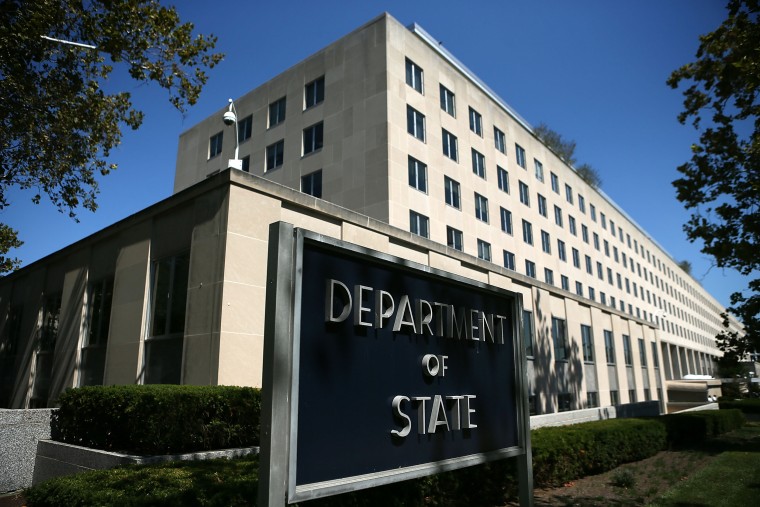State Department diplomats angered by President Donald Trump’s immigration order have let their indignation be known.
Hundreds of foreign service officers are expected to submit a dissent memo against the President’s decision announced Friday to block travel to the U.S. by people from seven majority Muslim nations for 90 days, by refugees for 120 days, and Syrian refugees indefinitely.
In a draft version of the memo obtained by NBC News on Monday entitled "Dissent Channel; Alternatives to Closing Doors in Order to Secure Borders," the diplomats argue that closing the door to "200 million legitimate travelers" in the hopes of preventing travel to the U.S. by a small number who intend harm "will not achieve its aim of making our country safer.”
“Moreover,” the cable says, "such a policy runs counter to core American values of nondiscrimination, fair play, and extending a warm welcome to foreign visitors and immigrants."
During a Monday briefing, White House Spokesman Sean Spicer scolded the diplomats, saying career bureaucrats who have a problem with the policy should “either get with the program or they can go.”
The Dissent Cable dates back to the 1960’s during the Vietnam War when the channel was established to ensure that senior leadership in the Department would have access to alternative policy views on the conduct of the War.
“[President Trump] has been clear on it since he taking office that he is going to put the safety of this office first,” Spicer said. “He is going to implement things that are in the best interest of protecting this country prospectively, not reactively and if someone has a problem with that agenda than that does call into question whether or not they should continue in that post or not.”
Related: Trump Travel Restrictions Spark Immediate Court Challenges
AFSA, the union for diplomatic foreign service officers, has not yet responded. But the Foreign Affairs Manual for the State Department is clear that employees who participate are offered protection: “Freedom from reprisal for Dissent Channel users is strictly enforced; officers or employees found to have engaged in retaliation or reprisal against Dissent Channel users, or to have divulged to unauthorized personnel the source or contents of Dissent Channel messages, will be subject to disciplinary action.”
Acting State Department Spokesperson Mark Toner confirmed the agency was aware of the memo.
"The Dissent Channel is a longstanding official vehicle for State Department employees to convey alternative views and perspectives on policy issues," Toner said. "This is an important process that the Acting Secretary, and the Department as a whole, value and respect. It allows State employees to express divergent policy views candidly and privately to senior leadership.”

State department officials say that several drafts of the memo are still circulating with Foreign Service officers gaining signatures and comment. The final version is expected to be submitted to the agency's senior management. According to these officials the memo reflects the widespread alarm throughout the building about the serious diplomatic consequences of the order. Several state department officials point specifically to its harm to bilateral relations with countries like Iraq who are integral U.S. partners in the fight against ISIS.
"It will immediately sour relations with these six countries, as well as much of the Muslim world, which sees the ban as religiously motivated," the draft reads. "These governments of these countries are important allies and partners in the fight against terrorism, regionally and globally. By alienating them, we lose the intelligence and resources to fight the root causes of terror abroad before an attack occurs within our borders."
A similar memo was signed by over 50 diplomats last June during the Obama administration, expressing dissent to U.S. policy in Syria and advocating for military action against Syrian leader Bashar al-Assad.
